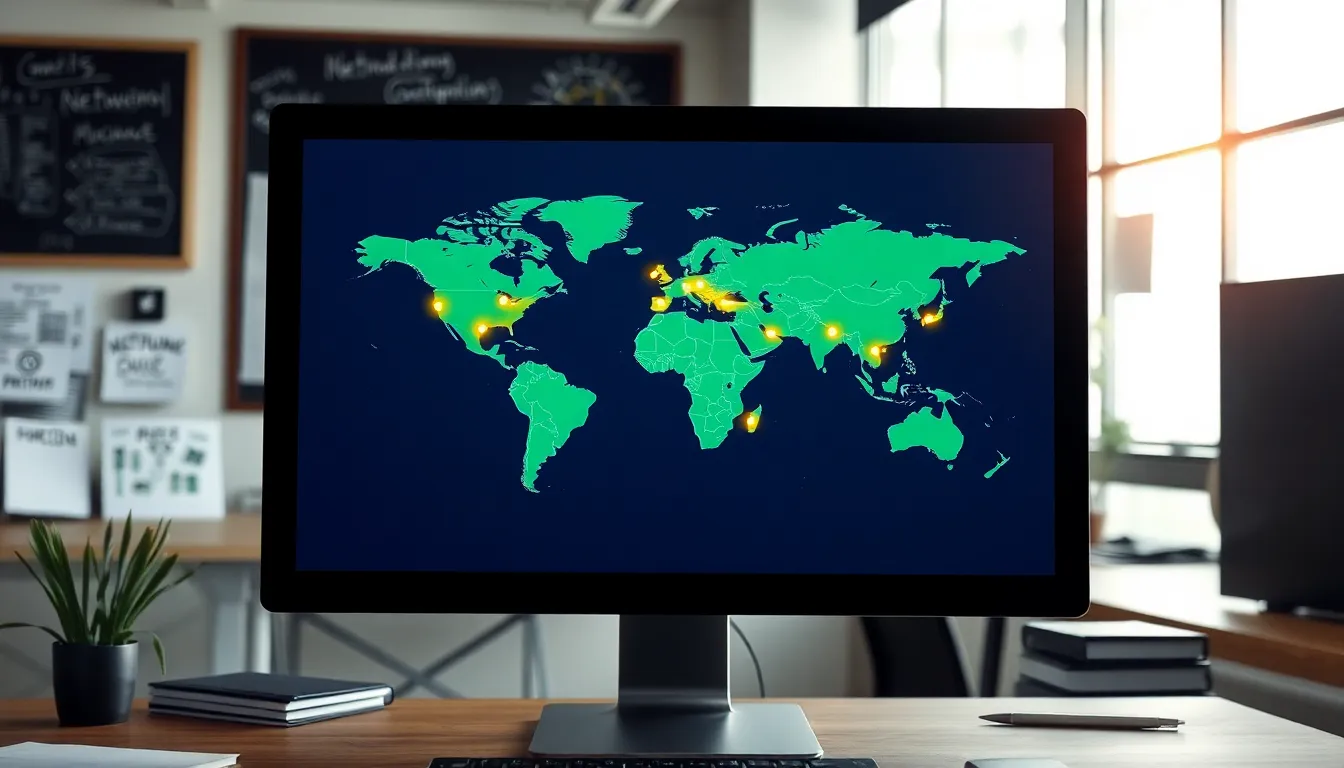Ever wondered where your IP address is hanging out? It’s like that elusive friend who always claims to be “on their way” but never quite shows up. Knowing the location of your IP can be surprisingly useful, whether you’re trying to access region-specific content or just want to impress your friends with your newfound tech-savvy skills.
Table of Contents
ToggleUnderstanding IP Addresses
IP addresses serve as unique identifiers for devices on a network. Knowing the details behind these addresses provides insight into online activities and geographical locations.
What Is an IP Address?
An IP address functions as a digital address for devices connected to the internet. This address helps route information between networks and devices. Each IP address consists of a sequence of numbers, typically formatted as four sets separated by periods, such as 192.168.1.1. Devices utilize this address to communicate, enabling users to engage with websites and services effectively.
Types of IP Addresses
Two main types of IP addresses exist: IPv4 and IPv6. IPv4 is the most commonly used format, consisting of 32 bits and supporting approximately 4.3 billion unique addresses. In contrast, IPv6 addresses, made up of 128 bits, accommodate a vastly greater number of devices, addressing the growing demand for internet connectivity. Static IP addresses remain constant, making them useful for hosting websites, while dynamic IP addresses change periodically, providing flexibility for users.
How IP Location Works

IP location relies on geolocation technology to determine where an IP address originates. This technology utilizes a combination of databases and algorithms to assign geographic information to an IP address. Geolocation databases collect and store data from various sources, including regional internet registries and user-submitted information.
Geolocation Technology
Geolocation technology identifies the physical location linked to an IP address through mapping networks and geographical data. It uses triangulation methods to pinpoint an IP address’s location with varying degrees of precision. Databases such as MaxMind GeoIP and IP2Location compile information from multiple sources to enhance accuracy. Users access specific tools online that leverage these databases to provide real-time location assessments based on the IP address input.
Factors Affecting IP Location Accuracy
Location accuracy can fluctuate due to several factors, including data source reliability and IP address type. Shared IP addresses often result in inaccurate locations, affecting users on the same network. Internet Service Providers may also assign IP addresses based on different criteria, leading to varying levels of precision. Geographic changes in internet traffic can further complicate accurate determinations, since an IP might belong to a mobile device that moves frequently.
Tools to Check “Where Is My IP Located”
Finding the location of an IP address is straightforward with various tools available online and through mobile applications. These resources simplify the process and enhance user experience.
Online IP Geolocation Services
Numerous websites offer real-time IP geolocation. Services like IPinfo and WhatIsMyIP provide instant access to an IP’s location along with additional details. Users often appreciate the user-friendly interfaces and quick results. Some geolocation services also display information about the ISP and associated city. Comparison tools can enhance accuracy by referencing different geolocation databases.
| Service | Features |
|---|---|
| IPinfo | Provides ISP and geographical info, real-time data |
| WhatIsMyIP | Offers city, ISP info, and additional security checks |
| GeoIP2 Lite | Utilizes MaxMind’s database for accuracy |
Mobile Applications for IP Lookup
Mobile applications also facilitate IP location checks. Apps like IP Location and Network Analyzer make it easy to view an IP’s details on smartphones. These applications typically feature intuitive designs and quick access to information. Users can check their own IP location or search for others. Many apps offer options to share results via social media or messaging.
| App Name | Platform |
|---|---|
| IP Location | iOS, Android |
| Network Analyzer | iOS, Android |
| IP Tracker | Android only |
Privacy Considerations
Being aware of IP address location brings privacy concerns into sharp focus. Users expose sensitive information when their IP address is tracked.
Risks of IP Tracking
IP tracking poses multiple risks to user privacy. Unscrupulous entities can gather personal information by leveraging IP data. Locations can be pinpointed and paired with online activities, creating a detailed user profile. With public Wi-Fi access points, individuals become even more vulnerable to tracking. Internet Service Providers may also retain user data, leading to potential misuses. Moreover, malicious actors can exploit IP information for cyberattacks, making security a pressing issue.
How to Protect Your IP Address
Several methods exist to safeguard an IP address from unwanted exposure. Utilizing a Virtual Private Network (VPN) encrypts internet traffic and masks the IP address. Relying on proxy servers can offer limited privacy improvements by routing traffic through an intermediary. Tor Browser provides anonymity by directing internet requests through multiple servers. Regularly reviewing privacy settings on devices and applications ensures tighter control over shared information. Employing strong firewalls and up-to-date security software aids in maintaining online safety.
Understanding the location of an IP address is crucial for navigating the digital landscape. It not only aids in accessing region-specific content but also enhances one’s technical expertise. With various tools and technologies available for IP location tracking, users can easily find their IP’s geographic details.
However, it’s essential to remain aware of the privacy implications that come with IP tracking. By implementing protective measures like VPNs and maintaining strong security protocols, individuals can safeguard their online presence. Staying informed about IP addresses and their significance empowers users to make smarter decisions in an increasingly connected world.




